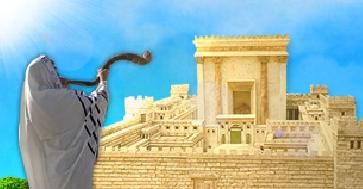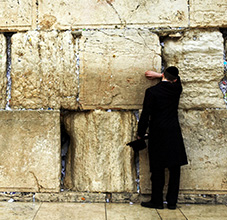Abraham’s Faith

By Sam Nadler
How can we have assurance of being right with God? We are sinners. We have so much fear, disappointment, and bitterness. How can we know that God hasn’t forsaken us? Does He really accept us as we are?
Once, after Shabbat classes, an 11-year old boy was asked by his mom what he had learned that morning. “Well,” Josh said, “our teacher told us how God sent Moses behind enemy lines to rescue the Israelis from the Egyptians. Moses led them to the Red Sea and then ordered his engineers to build a bridge. After they all crossed, they saw the Egyptian tanks coming, so Moses radioed the Israeli Air Force and they sent jet fighters, who bombed the bridge and saved the Jews.” Josh’s mother looked at him sideways and said, “Josh, is that really the way that your teacher told the story?” “Not really,” Josh admitted. “But if I told it her way you’d never believe it”.
Regarding salvation, Yeshua, Himself, explained to His own mystified disciples, “With men this is impossible, but with God all things are possible” (Matthew 19:26); so, it was with Abraham. Though Abraham believed in God, he was confused about God’s promise of a seed, so he cried out to God and told Him that his only heir was his servant, Eliezer (Genesis 15).
In the midst of this narrative we find a profound theological statement regarding Abraham: “and he believed the Lord; and He reckoned it to him as righteousness” (Genesis 15:6). If Abraham was struggling, then it seems that having struggles with God is not a sign of unbelief. Yet, what about the fear and disappointment? How can we be sure that God is with us and has a plan for us? How can we have assurance of being right with God? Is it through heroic torah-obedience? No, but if I told you what the scripture does say, you might never believe it! The assurance that we are made right with God is the same assurance that Abraham had. How does God deal with our fears? We will consider three things about how Abraham believed God:
- His faith was personal. He did not merely believe about God, but in Him.
- His faith was propositional. Believing in the person of God meant faith in the promises of God.
- His faith was practical. Belief necessitated action.
FAITH IS RELLIANCE UPON GOD’S PROMISES
Abraham had faith in God. His genuine faith was seen in his responses to God’s promises. The idea is highlighted in the text with the first word “and” (the letter vav in Hebrew) at the beginning of the verse. This conjunction, “and,” ties it to the previous verse, where God directed Abraham to look to the night sky and said, “So shall your seed be” (Genesis 15:5).
Faith is a response to God’s promise, not our own imagination of what we want. Abraham’s life of faith is seen in three periods of growth in Genesis:
- The period of his calling, Genesis 12-14
- The period of his covenants, Genesis 15-21
- The period of his confirmation, Genesis 22-25
In the New Covenant, we are informed in Genesis 12 that Abraham had been saved by faith when he first believed.
By faith Abraham, when he was called, obeyed by going out. (Hebrews 11:8)
The primary salvation, truth, found in Genesis 15:6 marks each of the three periods of Abraham’s life, and it is used in the New Covenant to characterize each period in His faith development (Romans 4:3; Galatians 3:6; Jacob 2:23). Romans 4:1-25 is Paul’s commentary or Midrash on Genesis 15:6 that portrays Abraham the father of faith. The test in Romans states that he believed the Lord:
He believed the Lord for many descendants (Genesis 15:5). What if Abraham prayed something like this: “That’s nice, God, but I’d like just two kids, a boy and a girl, healthy, intelligent, good looking, athletic, with good careers, and a few grandkids. Thanks.” Of course he then added, “And I really believe you can do it!” What would be the result of such belief? It would not be reckoned as righteousness, unlike faith in God’s Word.
He believed the Lord of one Glorious Descendent. The word “seed” in Genesis 15 is in the singular because it was pointing to Messiah. As Yeshua observed, “Abraham was glad to see My day, and he did see it” (John 8:58). For within the promises made to Abraham was the essential truth that Messiah was the goal of them all, even as Adam was assured in Genesis 3:15. Indeed, Yeshua is the very righteousness to which all torah (Law) would witness (Romans 3:21; 10:4). The demons believe God and tremble, but we believe in God and trust.
He believed the Lord apart from any natural means and that all would be accomplished through the power of God. Faith is trusting God despite the circumstances. It is not weakened or diminished by them. Faith trusts God’s power without denying our inability or wavering with inner disputes over the immensity of the promise. Abraham never denied his own inability, but trusted in what he believed God could do! Rather, he was strengthened in faith, as he gave glory to God, and he was confident and fully persuaded in the character of God, as well as His power. This faith was credited to him as righteousness (Romans 4:22).
Like Abraham, we are to contemplate that our bodies are as good as dead because of sin. As Abraham believed that the God who created the stars could create seed and life from him and Sarah, so, also, we are to believe that this God who created life was able to raise Yeshua from the dead (Romans 4:23-25). The whole Scriptures assure us that we are relating to God only when we are relying on His promises.



